Submitted by WA Contents
EAST Architecture Studio, Rayyane Tabet and AKT II win Inaugural AlMusalla Prize
Lebanon Architecture News - Oct 10, 2024 - 14:05 3007 views
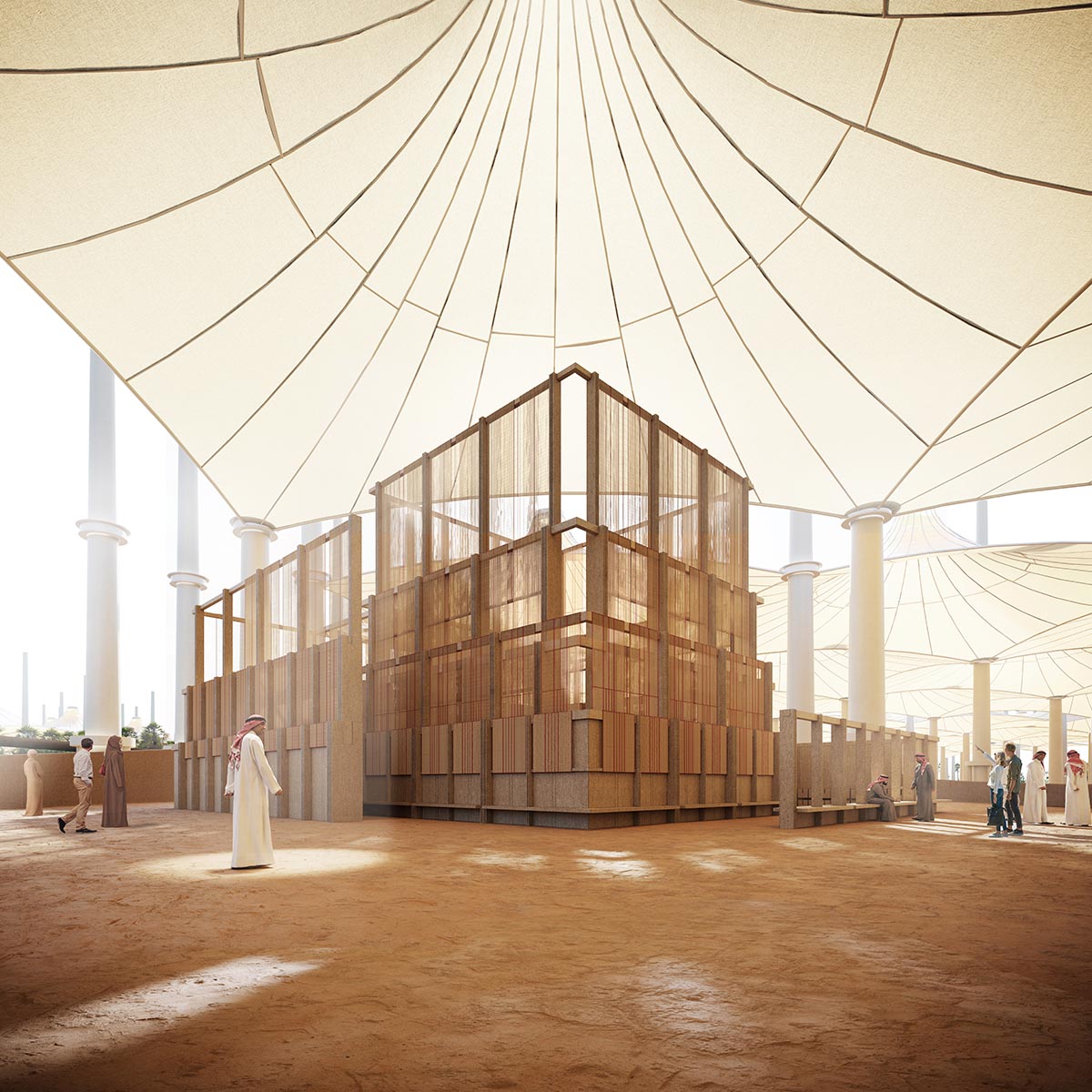
Lebanon-based collective EAST Architecture Studio, international engineering firm AKT II, and Beirut and San Francisco-based artist Rayyane Tabet have won the inaugural AlMusalla Prize, a new architectural competition launched as part of the Islamic Arts Biennale.
Announced by the Diriyah Biennale Foundation, the winning design has a modular structure that draws inspiration from local weaving customs.
The project is made of waste products collected from nearby date palm trees, primarily palm fiber and fronds. The Musalla will be dismantled and rebuilt at a new location following the four-month Biennale.

The Western Hajj Terminal at King Abdulaziz International Airport in Jeddah, Saudi Arabia, is the location of the Islamic Arts Biennale. An international architecture competition, the AlMusalla Prize, is being held to design a Musalla, a place for prayer and reflection.The winning design will not only be constructed, but it will also come with a cash award.
AAU Anastas (Palestine), Sahel AlHiyari (Jordan), Dabbagh Architects (Saudi Arabia), and Asif Khan (United Kingdom) were among the architects on the shortlist that went on to choose the winning team. Prince Nawaf Bin Ayyaf (jury chair), Farrokh Derakhshani, Lina Ghotmeh, Azra Akšamija, and Ali Malkawi are the members of the competition jury.
The second edition of the Islamic Arts Biennale will open from January 25 to May 25, 2025, in Jeddah, coinciding with the inauguration of the Musalla.
The competition brief requested that architects work in teams with an engineer and an artist to jointly design a Musalla—a flexible, modular place of prayer that is open to both Muslims and non-Muslim guests.
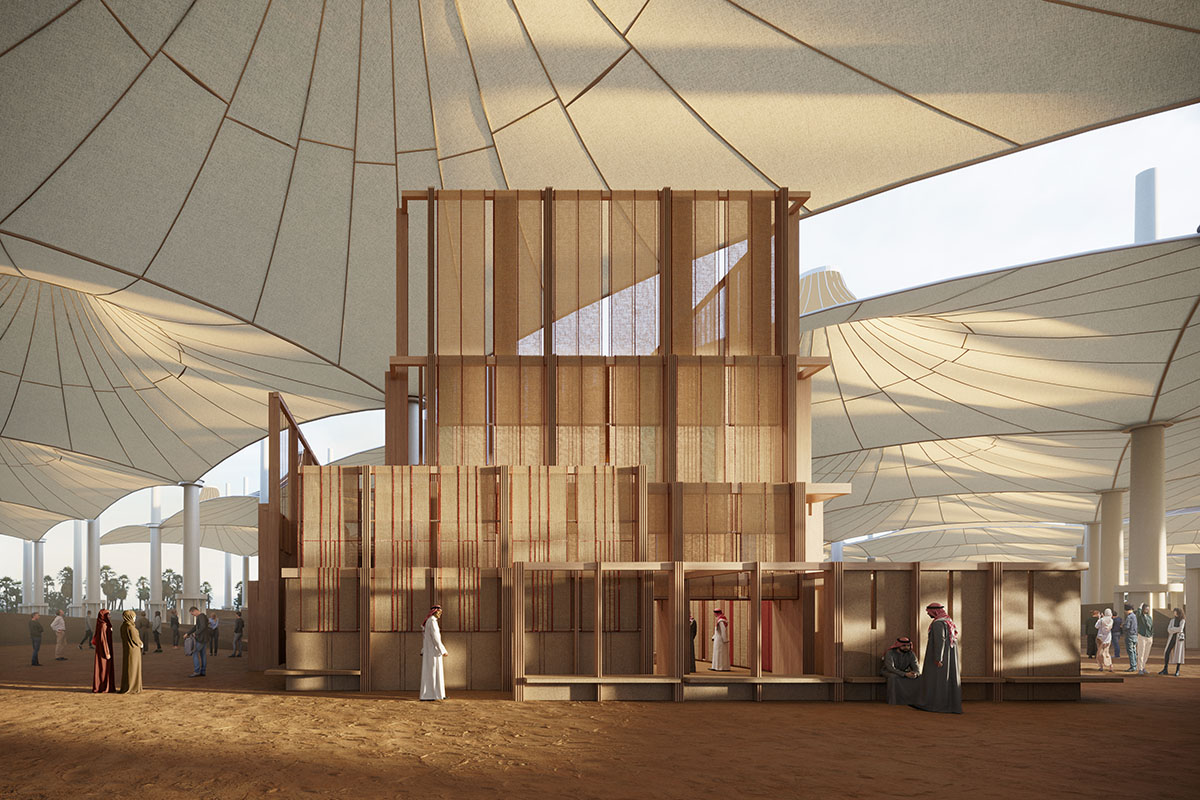
The brief stipulated that the building needed to be at least 150 square meters in size, fulfill all the requirements for prayer, and be built using a sustainable method. The brief also emphasized how crucial it was for the structure to be easily disassembled and reassembled, highlighting the project's legacy and afterlife in order for the structure to survive after the Islamic Arts Biennale.
The concept, created by EAST Architecture Studio, AKT II, and Rayyane Tabet, tackles the two fundamental aspects of Islamic prayer—togetherness and proximity. It draws inspiration from the weaving process, which combines spirituality and artistry. The layout includes prayer areas that create a loom-like structure around an open central courtyard.
The winning design calls for the construction of a pavilion mostly out of the waste materials from nearby date palm trees, a naturally occurring resource that is abundant in the area. The design demonstrates how it can be used as a building material rather than disposing of it in a landfill or burning it. The winning proposal aims to demonstrate this sustainable resource's feasibility.
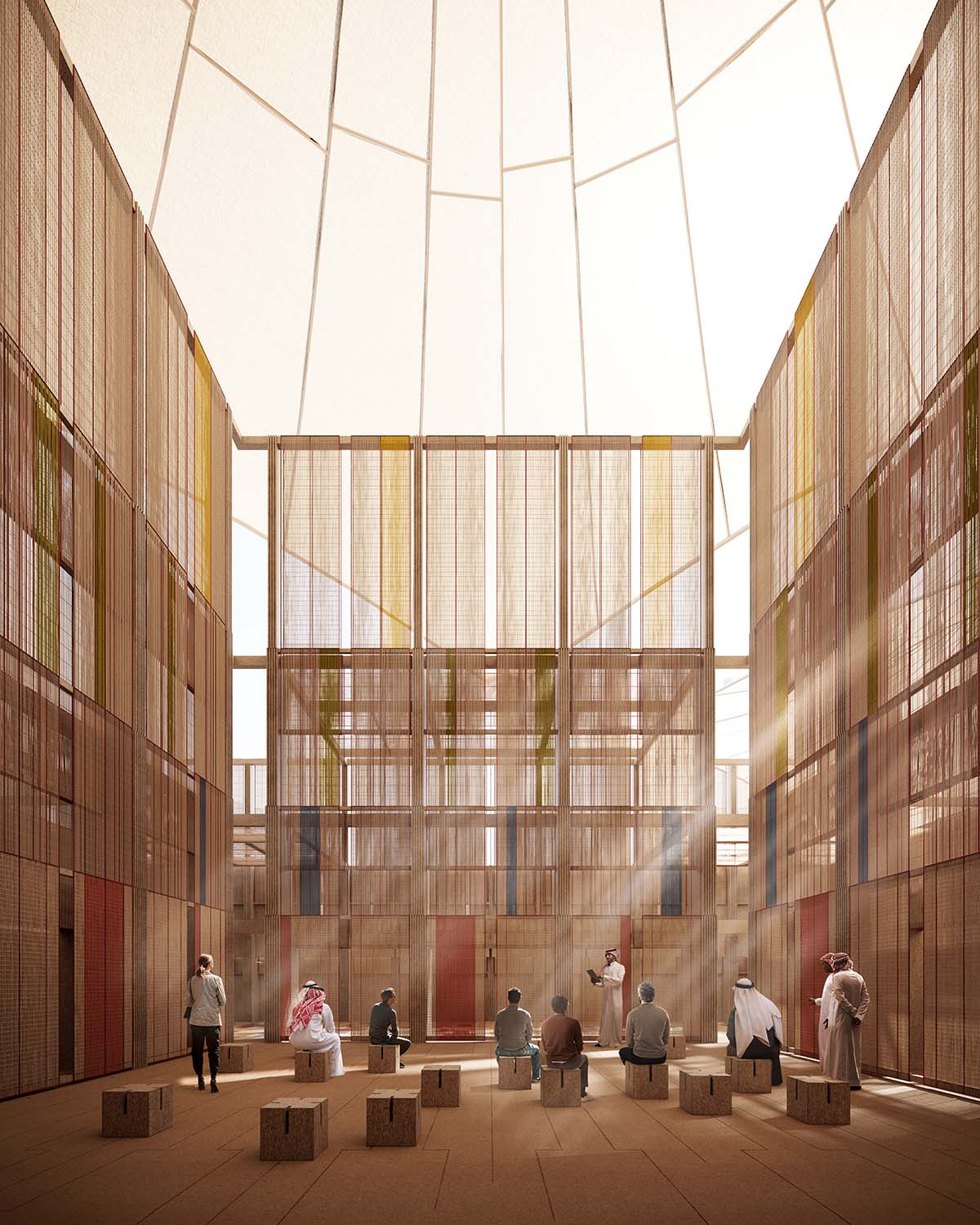
The material palette alludes to vernacular architecture and is influenced by customary building techniques used in Jeddah, particularly in the historic district of AlBalad. The Musalla suggests bringing these colloquial forms and practices back into use. It presents a modular toolkit of components that can be taken apart and put back together to travel to different locations throughout Jeddah and beyond. The interior of the Musalla embodies the subtle, sublime beauty of woven fabric, featuring a multi-layered structure that rises from the earth and tapers gently toward the Hajj Terminal's canopy.
Textiles treated with natural dyes line the central space's walls and floor. It is located in an environment delineated by a 6 x 6 meter grid that was modeled after the size of Saudi Arabian palm-tree plantations.
The winning project was chosen by the jury because it presented a nuanced understanding of Muslim architectural traditions as being rooted in their natural surroundings and the sense of community they create. The winning project also demonstrated a great deal of potential for serving as a model that, if successful in its material exploration and construction experimentation, could become quite revolutionary. The design exemplifies how locally specific vernacular materials still provide insights and inspiration for contemporary living and spatial organization.
In Islam, places of worship are also communal areas. The project acknowledges this fact by making its interiors transparent and welcoming, as well as by participating in events at the Hajj Terminal and the Islamic Arts Biennale, which are both hubs for cultural exchange.
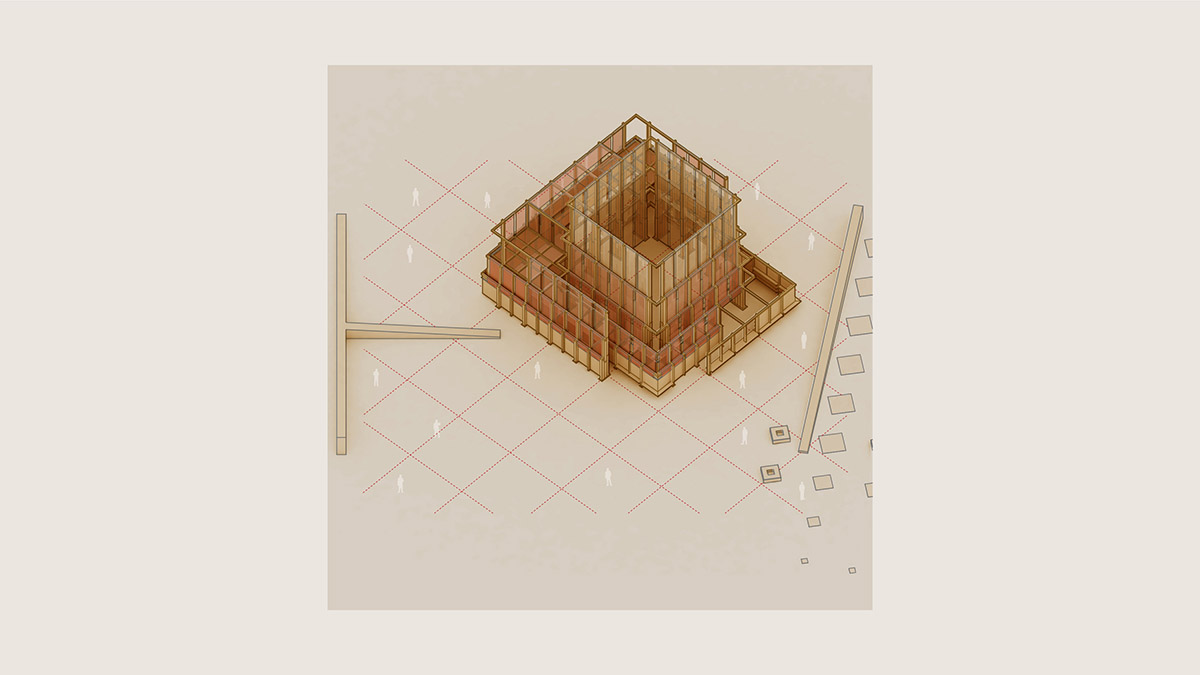
Massing diagram
The design offers guests a deeply personal and shared experience by being both grand and intimate. This is a microcosm of the Hajj Terminal's space. The imposing structure of the terminal acts as a metaphorical entryway for travelers en route to the sacred cities of Makkah and Madinah. At the Hajj Terminal, the Islamic Arts Biennale unites visitors from all over the world by using the arts of Muslim societies as a common theme. The AlMusalla Prize unites spirituality and art, encouraging viewers to consider the artistic expression that has been influenced by Islam for centuries and up to the present.
During the four months of the Islamic Arts Biennale, the Musalla will be open for business. Following its conclusion, it will be disassembled, moved, and put back together.
"The winning design brilliantly marries sustainability with an original perspective on Musalla architecture, utilizing not only local materials like palm timber in a modular structure, but also inspired by the rich local tradition of weaving," said Prince Nawaf Bin Ayyaf, jury chair of the AlMusalla Prize.
"This interdisciplinary collaboration between architects, an artist, and engineers has resulted in a contemporary interpretation of Islamic architecture that feels both sacred and inclusive."
"The team's demonstrated knowledge of architectural heritage, combined with their forward-thinking approach to creating a versatile space, truly embodies the goals of this competition."
"The result is a revolutionary prototype that utilizes unique construction materials and methods, which will hopefully serve as a blueprint for an incredibly sustainable future of regional architecture that is deeply rooted in local traditions," added Prince Nawaf Bin Ayyaf.
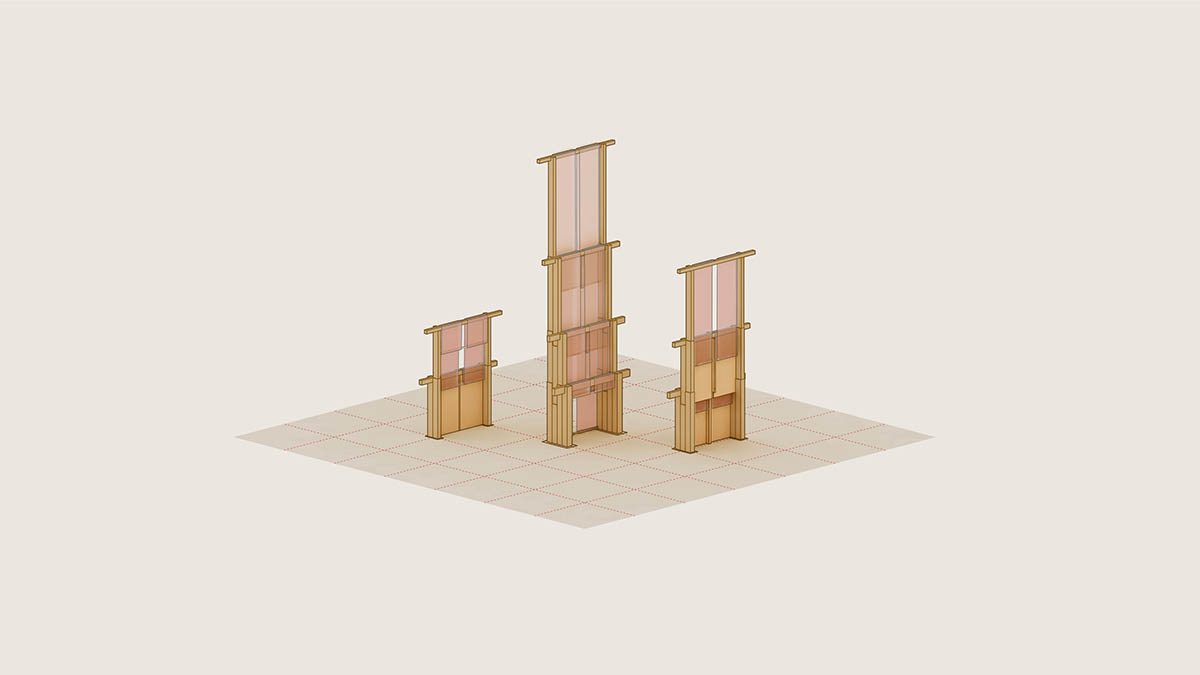
Assembly diagram
The Islamic Arts Biennale, organized by the Diriyah Biennale Foundation, offers an unmatched setting for education, research, and understanding while also serving as a comprehensive forum for fresh conversations about Islamic arts. At the Aga Khan Award-winning Western Hajj Terminal at King Abdulaziz International Airport in Jeddah, a city that has long served as a crossroads for cultural exchange and a gateway for millions of pilgrims traveling to Makkah and Madinah, the exhibition is held every two years.
Currently, the Islamic Arts Biennale announced the theme as "And all that is in between" for the second edition of the Islamic Arts Biennale. The theme will examine the various ways that feeling, thinking, and making are used to experience, express, and celebrate faith.
All images © EAST Architecture Studio.
